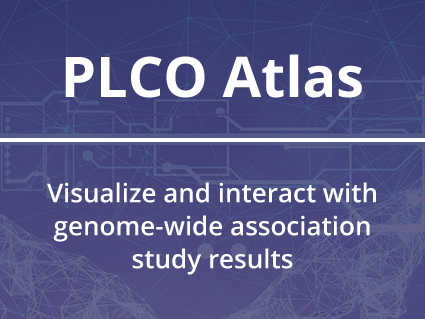The PLCO Atlas – GWAS Explorer: Milestone in Data Sharing
, by Jennifer Loukissas, M.P.P.
In keeping with the Findable, Accessible, Interoperable, and Re-usable (F.A.I.R.) principles for data stewardship, the PLCO Atlas GWAS Explorer was created to serve as an interactive tool to facilitate data sharing, which enables researchers to search for, visualize, and download aggregated association results from the PLCO genome-wide association (GWAS) analyses. This resource is an extraordinary collaboration among a large group of people. A summary of the project was published in the journal Scientific Data on January 12, 2023.
The Prostate, Lung, Colorectal, Ovarian (PLCO) Cancer Screening Study is a large population-based randomized trial designed and sponsored by the National Cancer Institute (NCI) to determine the effects of screening on cancer-related mortality and secondary endpoints in men and women aged 55 to 74. The screening component of the trial was completed in 2006.
The PLCO Atlas includes genotype data of 110,562 PLCO subjects (on 5 different Illumina arrays and the imputed data against the TopMed reference panel 5b through the Michigan Imputation Server) as well as a comprehensive list of over 200 phenotypes collected from questionnaire data, linkage to medical records, cancer registries, and the National Death Index. Tools are available to visualize association results by interactive Manhattan plots that allow for stratification by sex as well as other diagnostic plots (e.g., Q-q plots). Furthermore, descriptive characteristics of PLCO, annotation of phenotypes, and links to other pertinent genomic resources are available.
Phase II data contains GWAS results of 90 cancer and cancer-related phenotypes including prostate cancer, breast cancer, lung cancer, colorectal cancer, melanoma, chronic lymphocytic leukemia, body mass index, height, smoking history, coffee intake, PSA at baseline, and CA-125 at baseline. There are >200 phenotypes of various cancer types and cancer risk factors that are planned in the analysis pipeline and the results will be posted when they become available.
DCEG users can submit requests for use through the DCEG Data Use Permission System (DUPS).
Resource Website: PLCO GWAS Explorer
Reference:
Machiela, M., et al. GWAS Explorer: An open-source tool to explore, visualize, and access GWAS summary statistics in the PLCO Atlas. Scientific Data, 2023.
